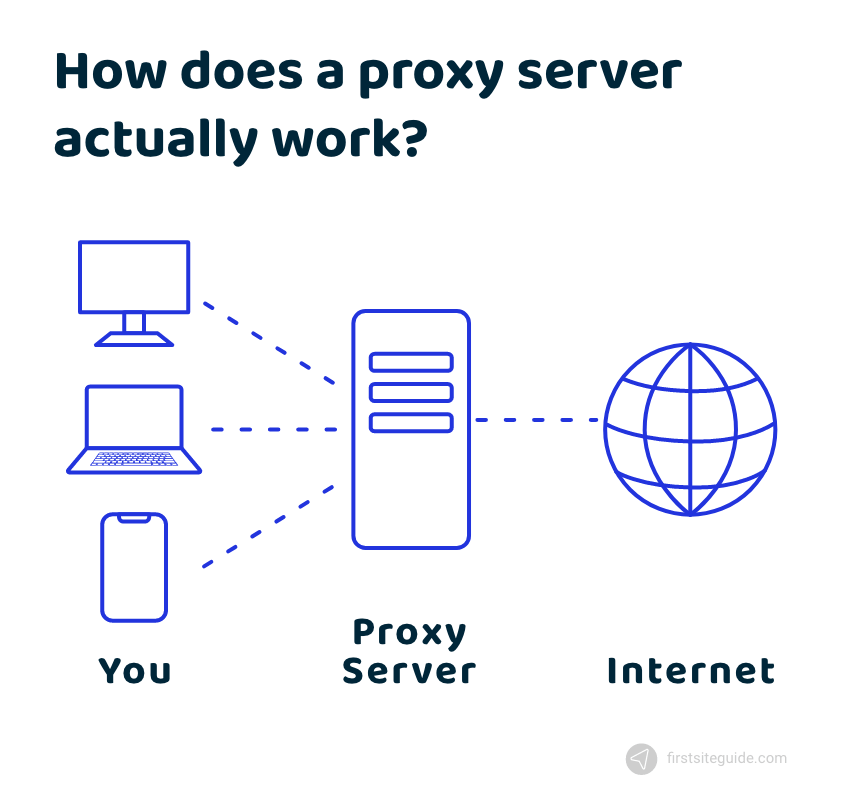In the current digital landscape, obtaining content online can often seem like traversing a labyrinth. Geo-restrictions set by websites and streaming platforms can obstruct your capability to enjoy the content you desire. Fortunately, proxy servers have emerged as a widely-used solution to circumvent these barriers, providing users with the means to unlock geo-restricted content effortlessly. However what exactly is a proxy server, and how does it work?
By acting as an intermediary between your device and the internet, proxy servers can hide your IP address and make it appear as though you are surfing from a different location. This functionality not only enables access to region-locked content but also offers advantages in regarding confidentiality and security. As we delve further into the world of proxy servers, we will investigate their different types, their differences from VPNs, and how they can improve your online experience while safeguarding your identity. If you are a regular internet user or a business seeking protect confidential data, grasping how proxy servers work is crucial in today's linked world.

Comprehending Proxy Servers
Proxy services serve as middlemen between users and the web. When you connect to a proxy server, your requests for online content are directed to the server instead of going straight to the intended website. This implies that the proxy retrieves the data on your account, allowing you to access content while hiding your true IP address. The result is a degree of anonymity and privacy, making it challenging for sites to follow your browsing behavior.
The way proxy servers operate can change, depending on the type of proxy being used. Some proxies, including HTTP or SOCKS, are created for particular protocols and applications. To illustrate, an HTTP proxy is optimized for internet traffic, while a SOCKS proxy is more flexible, accommodating different types of internet traffic. Comprehending these differences can assist users choose the suitable kind of proxy to meet their requirements.
In alongside privacy gains, using proxy servers can improve online security. By directing internet data through a proxy, confidential data can be encoded, thereby prevent illicit access. Companies often make use of proxy servers to control and supervise employee internet usage, restrict harmful sites, and reduce vulnerability to online threats. As more users recognize the importance of online protection and privacy, the function of proxy servers keeps increasing in value.
Benefits and Risks of Proxy Usage
The use of proxies offers several advantages that can significantly enhance digital interactions. One of the main advantages is enhanced privacy online. By masking your IP address, a proxy helps protect your identity, making it more difficult for websites and marketers to track your online activities. This added layer of anonymity can be particularly helpful for individuals concerned about data privacy and surveillance. Furthermore, proxy servers can assist overcome geo-restrictions, allowing users to access materials that may be inaccessible in their regions.
However, there are also risks associated with utilizing proxies that users should be aware of. Many complimentary proxy servers may jeopardize user security, as they can log your activities or inject ads into the websites you visit. Additionally, some proxy servers may not sufficiently secure your data, leaving you vulnerable to cyber threats. Users must exercise care when selecting a proxy, as the incorrect choice could threaten the very safety and protection they are attempting to obtain.
Another concern revolves around potential performance drawbacks. While proxies can improve speed in specific situations, such as storing frequently used data, they can also cause delays if the proxy is overwhelmed or if there is a poor network connection. This can result in undesirable experiences, especially for activities that require high speeds, such as gaming online or streaming. click for individuals to consider the benefits against these drawbacks to make informed decisions about their use of proxies.
Proxy servers for Streaming and Gaming
Proxy systems play a key role in enhancing streaming experiences and optimizing the gaming experience. For media platforms like Hulu and Hulu, content restrictions can hinder access to shows based on your location. Using a proxy service allows you to overcome these limits by hiding your IP address and appearing as if you are using the platform from a different region. This allows viewers to reach a broader range of shows and movies while utilizing their beloved media platforms without any difficulty.
Online gaming is another area where proxy systems can greatly boost gamer experience. Many players experience issues such as lag and latency, which can obstruct the gaming experience. By associating to a proxy service, gamers can minimize latency by connecting to nodes closer to the game's data center. Additionally, proxy systems can help bypass regional bans that might be imposed on users engaged in competitive gaming, permitting them to have a continuous gameplay without disruptions caused by geographical bans or bans.
Furthermore, proxy servers can bolster overall gameplay security by masking your true IP address, thereby protecting you from malicious entities from malicious entities. This added layer of privacy is vital in online multiplayer environments where player data can be exploited. By utilizing a proxy, users can not only play region-locked games but also guarantee their internet safety while doing so, ultimately leading to a better and safe gameplay experience.
